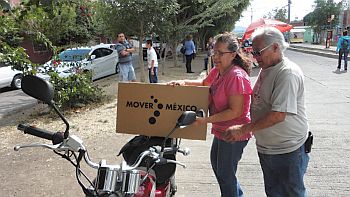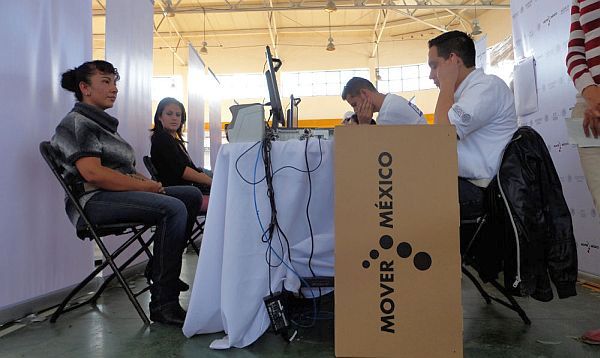On a recent Saturday in November, housewife Berenice Serra emerged in the midday sun from an auditorium doubling as a government distribution point in Morelia, capital of the western Mexican state of Michoacan.
In one arm she clutched her one-year-old son, in the other a cardboard box emblazoned with the government's current official slogan, Mover a Mexico — Moving Mexico. Inside was a brand-new digital television, completely free, direct from the government.
A host of other families were cradling identical cardboard boxes, part of a $1.9-billion government campaign aimed at making sure every household in Mexico has a digital television before the government switches from analog to digital open TV signals at the end of 2015.
"This is a step forward," Serra said as she waited for a bus to take her on a one-hour ride back to her working-class Morelia neighborhood.
"The old TV's aren't going to work anymore and this gives us the opportunity, even those of us with few resources, to watch the programs we like: news, soap operas, and cartoons for the children," she said.
All over the country similar scenes will take place over the next year.
Mexico's government is handing out a total of 13 million digital television sets, officials said, gratis, to poor Mexicans already subscribed in federal welfare programs. The TV handout is part of a wider telecommunications reform package passed by Mexico's congress in July.
But critics say the program is a blatant electioneering ploy, one that reminds people of the "old days" of client-state handouts under the currently ruling Institutional Revolutionary Party, or PRI.
More than half of the TVs are being distributed before or during the summer 2015 mid-term election season, in which Mexicans will vote on nine governors, 500 legislators, and 718 leaders of municipalities.
Mexican parties of all colors are well known for handing out gifts for political ends.
But the PRI has been particularly linked to the practice, despite its efforts to present itself as a "new" party since the 2012 election of Enrique Peña Nieto. That race brought the PRI back to power, 12 years after it was voted out from 70 years as Mexico's government.
 |
Now the prospect of millions of grateful voters receiving TV's from a PRI government around election time is ringing alarm bells among opposition voices like Juan Pablo Adame Aléman, a congressman with the center-right National Action Party, or PAN. Congressman Adame heads the digital and information technology agenda in Mexico's congress.
"If you just hand out televisions, you run a grave risk of repeating the past century when the PRI governed and handed out gifts of beans and rice to get a vote," said Adame in an interview. "Now they could be seen as handing out televisions in exchange for votes. That is the risk."
He said he asked the federal agency in charge of handing out TV's to hold off during the election year, but his request was refused.
After the PRI's successful bid to regain the presidency with Peña Nieto, thousands of voters said they were given supermarket vouchers by PRI activists in the weeks before the 2012 vote. Peña won with 38 percent.
The social development ministry, known as "SEDESOL" in Spanish, last year had to fire a Veracruz state coordinator along with six other staff members after local PAN leaders claimed that they were using social programs to win electoral support for the PRI.
The Sedesol agency is now tasked with handing out the TV's.
Serra and other recipients of free digital sets said they were just happy to get their hands on a new television. They also said that officials attached no conditions to the gift. No political parties were mentioned, people picking up their TV sets had said.
"I feel like a child with a new toy, I'm so happy," said Jose Luis Muñoz, before hopping on his motorbike with his wife and new TV set. "I've received many benefits from the government, but this one is a beautiful thing for my family."
Lorenzo Meyer, a respected Mexican historian and political analyst, said that even measures meant to feign electoral neutrality are all part of a subtle game that parties have been playing in Mexico for generations.
"The fact that it's happening at the start of the mid-term elections isn't fooling anyone. Whoever gets the television knows where it comes from, and understands that this is a quid pro quo," Meyer said in an interview.
"It's very well thought out because the opposition won't be able to say, 'You're buying votes with this,' because it's part of legislation, a national necessity," he added. "But no one deep down can deny that there is a clear electoral advantage being gained."
The ministry's website explains that the switch to a digital signal will mean "better quality image and sound, a new and wider selection of channels, the incorporation of services like subtitles, language choice, interactive services, multi-vision camera, and services for people with hearing or visual problems."
Mexico is not alone in making the shift from analog to digital television. Many other developed and developing countries have either finished or are also in the process of switching to digital TV.
 |
The televisions are costing the government approximately $143 each, which adds up to the $1.9 billion total cost of the program, the SCT said.
But there are probable hidden costs in what has been a less than transparent process, said Gabriel Sosa Plata, a communications professor at Mexico's Metropolitan Autonomous University, and a member of a non-profit telecom watchdog group called Observatel.
"It's difficult to know exactly how much it is going to cost because the government hasn't included the logistical costs involved in what is a huge operation. Also we don't know exactly how many people will receive the televisions, when, or who they are," Sosa said.
Even the information over which companies are producing the televisions is difficult to come by for non-experts poring through government documents, he added. "And this lack of transparency leads to a lack of trust in the plan."
The transport and communications ministry says that the more energy-efficient digital televisions will essentially repay the money being invested in the program over time, saving the country's citizens and government an estimated $2.2 billion over the next 10 years on electricity bills, the government said.
The wider selection of free-to-air channels that will be available on digital television will also be a plus for Mexicans who don't have many choices outside of Televisa and TV Azteca, said Ana Lilia Moreno, an analyst who covers telecommunications for the Mexico City think-tank CIDAC.
The two media giants currently have an almost duopolistic control of the open TV market in Mexico.
"It's an advance, but for the population, it's a bit of a frivolous outlay," Moreno said. "I think it would be better to focus on connecting more people, schools, and hospitals to the Internet rather than to spend such a large amount of money on television."
The government has a plan to provide widespread wireless Internet coverage in public spaces throughout the country, and the digital televisions it is handing out also have a port to connect to the Internet. But there is a long way to go.
Just three out of ten Mexican families had a home Internet connection in 2013, while more than 94 percent had a TV set, government figures show.
Francisco Alcantara, 68, said he was unaware of the controversy over the digital television handouts as he picked up his free TV in Morelia. He didn't have the money for gas, so he walked two hours to the distribution center.
Holding his new set, he stopped to share a more pragmatic viewpoint. "I just take what they give me, because you don't look a gift horse in the mouth," he said.
Original Story


